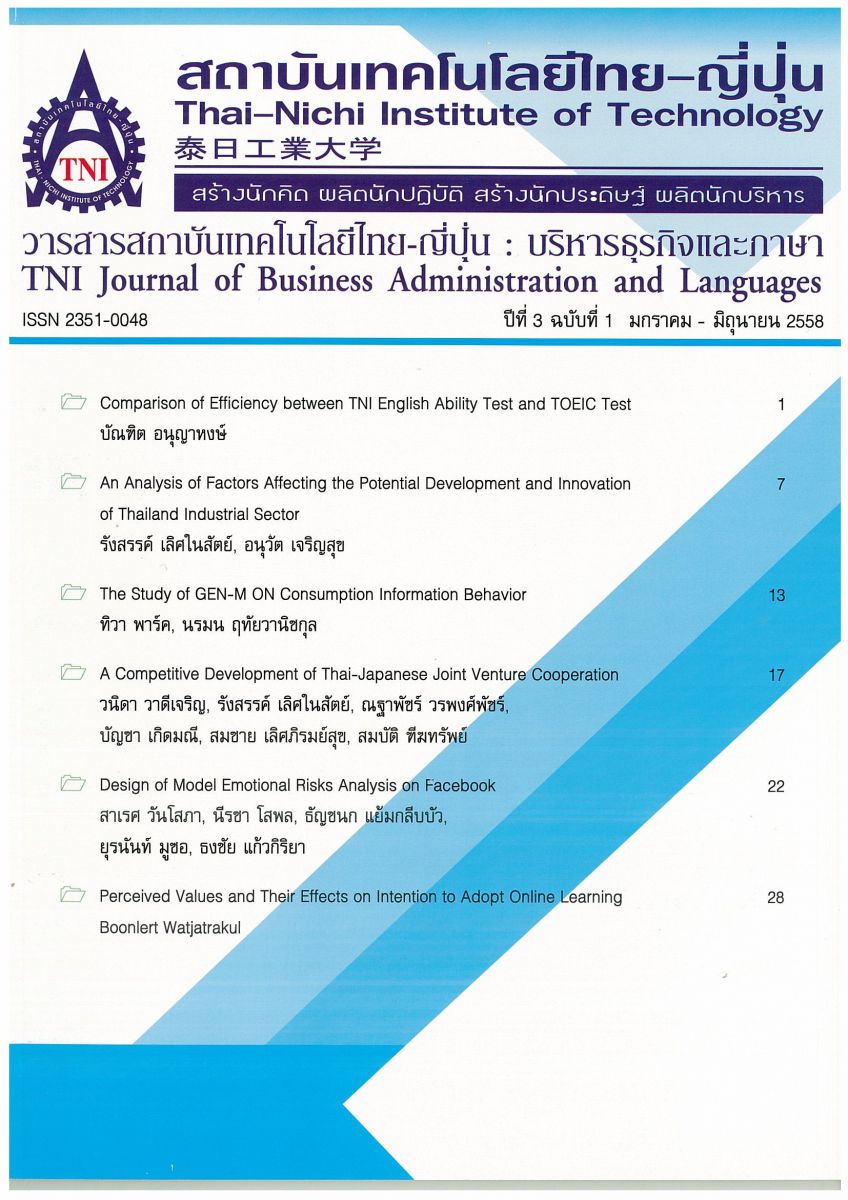Design of Model Emotional Risks Analysis on Facebook
Main Article Content
Abstract
งานวิจัยนี้มีวัตถุประสงค์เพื่อนำเสนอแนวคิดวิเคราะห์ความเสี่ยงทางอารมณ์ของผู้โพสต์ข้อความบน Facebook โดยใช้หลักการ การจัดประเภทกลุ่มคำจากการตัดคำและการวิเคราะห์คำเหมือนของประโยคในการวิเคราะห์ข้อความการโพสต์ของผู้ใช้งาน Social network ซึ่งในงานวิจัยนี้ได้นำเสนอโมเดลโดยแบ่งออกเป็น 9 โมดูล คือ 1) Original Post Module คือ โพสต์, บทความ หรือ ข้อความต่างๆ ที่อยู่บน Facebook, 2) Match Related Posts Module คือ การเช็คความสัมพันธ์ของผู้โพสต์ ว่ามีความสัมพันธ์กับบุคคลใดในเฟสบุ๊ค, 3) Other Posts Module คือ การโพสต์ข้อความของบุคคลที่มีความเกี่ยวข้องกันกับผู้โพสต์, 4) Cut Words Module คือ ส่วนของการตัดคำจากบทความที่มีการโพสต์ เพื่อดูแนวโน้มของคำ, 5) Words Risk Analysis Module คือ ส่วนของการวิเคราะห์คำที่ได้จากการตัดคำ, 6) Words Classification Module: Scaling Hazardous Words เป็นส่วนของการแบ่งกลุ่มคำหรือกลุ่มประโยค, 7) Checking for relate groups Module เป็นการเช็คความสัมพันธ์ของแต่ละโพสต์ กับโพสต์ตัวอย่าง, 8) Word Matching to Relative Post Module เป็นการวิเคราะห์ความสัมพันธ์ของแต่ละโพสต์ และส่วนสุดท้าย คือ Present the Result Module คือ ส่วนของการแสดงผลที่ได้จากการวิเคราะห์โพสต์ตัวอย่างกับโพสต์ที่เกี่ยวข้อง นอกจากนี้ได้พัฒนาตัวต้นแบบ และทำการประเมินผลการใช้งานระบบจากผู้ใช้งานทั้งหมด 9 ท่าน พบว่า มีความพึงพอใจโดยรวม อยู่ในระดับสูงเฉลี่ยที่ 3.556/5 (S.D.=0.53)
Article Details
Article Accepting Policy
The editorial board of Thai-Nichi Institute of Technology is pleased to receive articles from lecturers and experts in the fields of business administration, languages, engineering and technology written in Thai or English. The academic work submitted for publication must not be published in any other publication before and must not be under consideration of other journal submissions. Therefore, those interested in participating in the dissemination of work and knowledge can submit their article to the editorial board for further submission to the screening committee to consider publishing in the journal. The articles that can be published include solely research articles. Interested persons can prepare their articles by reviewing recommendations for article authors.
Copyright infringement is solely the responsibility of the author(s) of the article. Articles that have been published must be screened and reviewed for quality from qualified experts approved by the editorial board.
The text that appears within each article published in this research journal is a personal opinion of each author, nothing related to Thai-Nichi Institute of Technology, and other faculty members in the institution in any way. Responsibilities and accuracy for the content of each article are owned by each author. If there is any mistake, each author will be responsible for his/her own article(s).
The editorial board reserves the right not to bring any content, views or comments of articles in the Journal of Thai-Nichi Institute of Technology to publish before receiving permission from the authorized author(s) in writing. The published work is the copyright of the Journal of Thai-Nichi Institute of Technology.
References
สถิติการเติบโตของผู้ใช้ Facebook ในไทย และช่วงเวลาไหนคนใช้ Facebook มากที่สุด? [Online]. Available: <https://www.it24hrs.com/2014/infographic-thai-facebook-user-2014/> (เข้าถึงเมื่อ 09 ต.ค. 57).
พฤติกรรมการใช้เฟสบุ๊ค (Facebook) ของนักศึกษาในเขตกรุงเทพมหานคร, ผศ.ดร.บุญอยู่ ขอพรประเสริฐ, [Online]. Available:<https://oknation.net/blog/boonyou/2014/08/21/entry-1>, (เข้าถึงเมื่อ 09 ต.ค. 57).
อนุพงศ์ คำมา, “ปัจจัยที่เกี่ยวข้องกับการฆ่าตัวตายสำเร็จ : กรณีศึกษาจังหวัดสุโขทัย” วารสารสมาคมจิตแพทย์แห่งประเทศไทย 2556; 58(2): 3-16.
Adam. d, “รายงานวิจัยเผยผลการทดลองเกี่ยวกับการถ่ายทอดอารมณ์ผ่านการโพสต์ข้อความบน Facebook,” [Online]. Available: <https://thumbsup.in.th/2014/06facebook-manipulated-6690000-users-news-feeds-to-run-a-psychology-experiment/>, (เข้าถึงเมื่อ 09 ต.ค. 57).
แอพพลิเคชั่นต้านฆ่าตัวตาย [Online]. Available: <https://www.manager.co.th/Qol/viewNews.aspx?NewsID=9570000107064>, (เข้าถึงเมื่อ 09 ต.ค. 57)
W. Hsin-Ying, L. Kuan-Liang, M. Chandan, T. Charles “Understanding Customers Using Facebook Pages: Data Mining Users Feedback Using Text Analysis” in International Conference on Computer Supported Cooperative Work in Design., 2014.
S. Shankar, J. Rajendra, S. Sabya, M. Uma, “Classification of Facebook News Feeds and Sentiment Analysis”, International Conference on Advances in Computing, Communications and Informatics (ICACCI)., 2014
A. Jalel, D. Zeineb, J. Maria, “Text Mining Facebook Status Updates for Sentiment Classification”, in System Theory, Control and Computing (ICSTCC)., 2013 17th International Conference
Y. Mohamed, H. Hazem, “A Framework for Emotion Mining from Text in Online Social Networks”, in IEEE International Conference in Data Mining Workshops., 2010
H. Mary “Emotional Reflexivity in Contemporary Friendships: Understanding It Using Elias and Facebook Etiquette”, in Sociological Research Online, 16 (1) 11, [Online]. Available: <https://www.socresonline.org.uk/16/1/11.html/10.5153/sro.2292>
Text mining, [Online]. Available: <https://text2mining.blogspot.com/2010/10/text-miniing.html> (เข้าถึงเมื่อ 09 ต.ค. 57)
Text Mining : การทำเหมืองแร่ข้อความ, [Online]. Available: <https://www.datamininginnovation.com/text-mining/> (เข้าถึงเมื่อ 09 ต.ค. 57)


